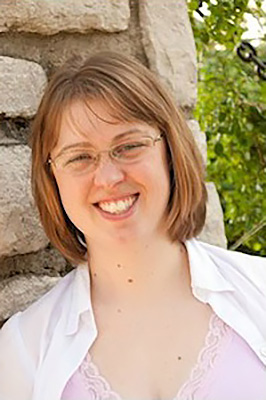Rachelle Noman
Class of 2003, Music Therapy
When asked what her favorite parts of the University of Evansville were, Rachelle spoke about the size of the University being perfect for fostering close friendships with students and faculty. Another bonus was the variety of performance opportunities including playing the oboe in musicals, workshops, in the Gumberts competition, and substituting for the Evansville Philharmonic Orchestra, all opportunities that may not have presented themselves at a larger university. As far as the role the UE had in preparing Rachelle for a career in music therapy, “I can't imagine a better preparation for being a music therapist and a leader in the field of music therapy. I am a strong musician and a strong clinician, and the professors I had at UE helped me to make connections in the professional world so that I can follow in their footsteps as a leader in the field now.” And, a leader she is - Rachelle is the founder of Soundscaping Source, serves on the board of Arts & AGEing KC, and is in demand regionally and nationally as a speaker, consultant, and staff trainer on topics related to music and eldercare, with recent presentations at the National Center for Creative Aging, the American Society on Aging, LeadingAge Kansas, and Alzheimer's Speaks Radio.
She has been a music therapy clinician in the Kansas City area running her own business since 2004 serving older adults in senior living and hospice settings. Norman earned her Master of Arts in music therapy from Saint Mary-of-the-Woods College, where she is now a faculty member. Of her career accomplishments, she is proud to have grown her business to expand to hiring another music therapist. She values the experience of mentoring and teaching other music therapists as a faculty member, and also through web-based coaching programs provided for music therapists who are business owners or work in eldercare.
When describing moments that confirm she made the right career choice Norman states, “The light bulb turns on almost every day for me. Many of the older adults I work with have dementia, which means they are slowed down and confused and cut off from the world around them because of their disease process. When I first see someone, she might be half-asleep or hunched over in a chair, not really engaging with me or anyone else. But in music – in carefully facilitated music experiences tailored by [the expertise of a board certified music therapist – this person can wake up and look around and sing or dance or play an instrument, and she is back in that room with us, basking in the joy and beauty of music. When I get in that zone with a client, I know I'm in the right career.”
Office Phone
812-488-2754
Office Email
music@evansville.edu
Office Location
Room 133, Krannert Hall of Art and Music

